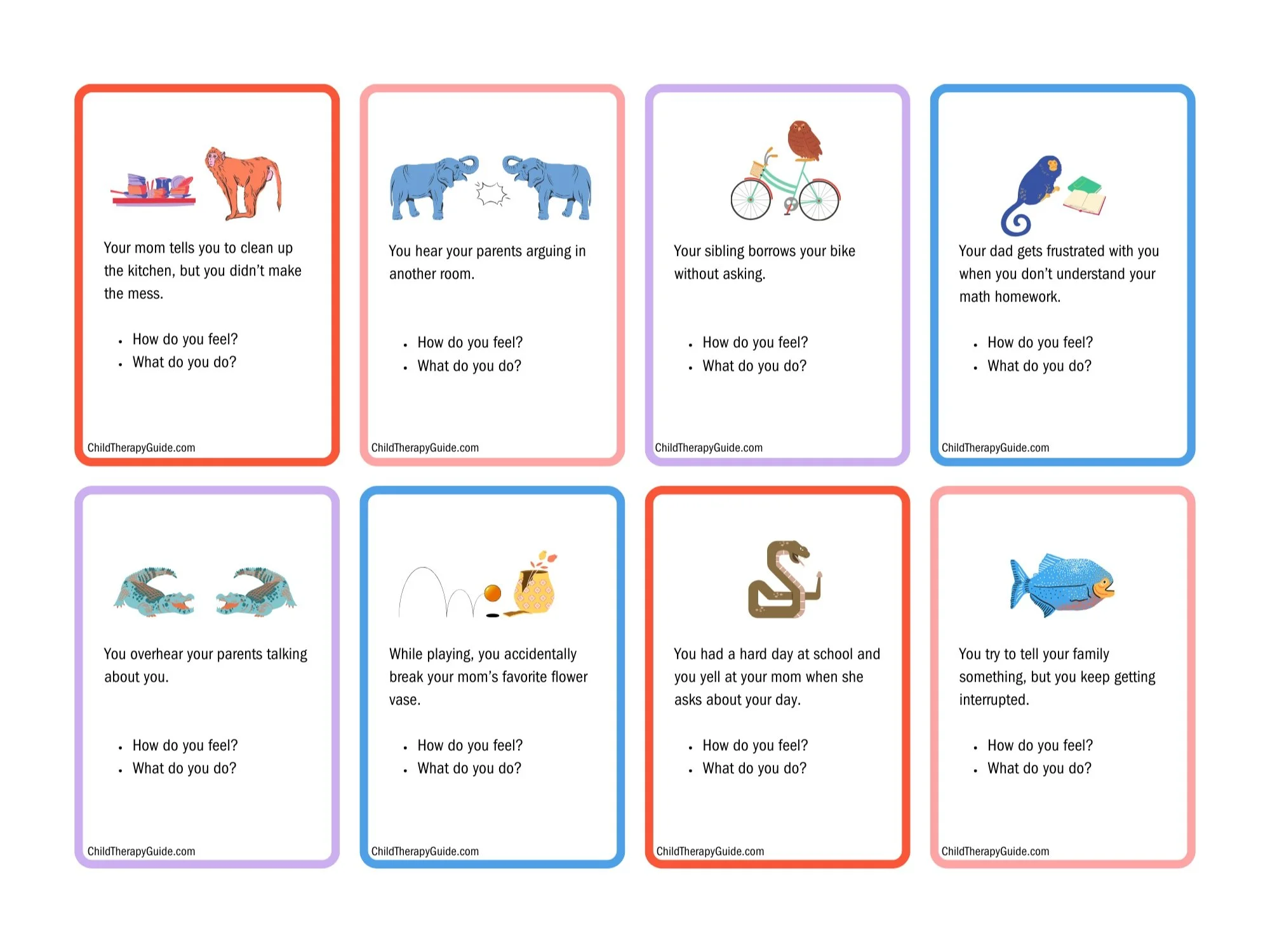Connection Through Conversation
How to Talk with Kids
Reciprocal conversation is an active exchange of thoughts, ideas, curiosity, and attention.
It’s a valuable skill and we can help cultivate it from a young age through engaged, thoughtful conversation.
Why are conversation starters helpful?
They promote important skills that improve social, emotional, behavioral, and psychological health.
Communication Skills: Encourage kids to articulate their thoughts clearly and effectively.
Active Listening: Uphold the expectation that kids engage in reciprocal conversation, which means they must attend to the responses of others.
Critical Thinking: Use thought-provoking prompts to encourage kids to use critical analysis to form well-reasoned opinions and responses.
Empathy: Exercise empathy by teaching kids to listen to, consider, and appreciate different perspectives.
Social Skills: Necessitate that kids navigate conversations, take turns, and engage with others in a positive and respectful manner.
Self-Expression: Build confidence and emotional intelligence by sharing thoughts and feelings with others.
Language Development: Introduce kids to new words, scenarios, patterns, and concepts.
Bonding: Encourage open and authentic conversation to help kids gain relationship-building skills and the ability to nurture a sense of connection and understanding with others.
In educational, therapeutic, and social settings, conversation starters improve interpersonal and cognitive functioning while promoting social engagement and development.
Resources that promote reciprocal conversation:
These resources are a great way to get the conversation started, but don’t be afraid to meander between questions and expand on stimulating topics. And whether it’s a conversation between two people or within a group, make sure everyone gets an opportunity for introspective input!
20 Question Prompts for Dinner Conversation
Gathering around the table for a meal creates a dedicated time for family members to come together, share their experiences, and strengthen bonds. Question prompts are a great way to get the conversation started!
Feeling and Scenario Cards
Feeling cards provide a visual and interactive way to explore a spectrum of feelings and coping skills. These cards can be used to facilitate open dialogue and help children articulate and navigate their emotions.
Home Scenario Cards
Home-based scenario cards help kids process social, emotional, and moral dilemmas while building empathy and coping skills. These cards present scenarios that often occur in the home, and are a great way to rehearse reactions so that kids have a prosocial roadmap to behave productively and engage with others.
Talking Points to Create Collaborative Game Plans
Parties or social gatherings often alter our daily routines. This can be especially disruptive to young kids. With anticipated disruptions in mind, these conversation starters promote social skills, confidence, problem-solving, and emotional regulation by helping kids feel heard, understood, and excited about the possibilities that lie ahead. Preparedness in kids (and adults!) contributes to overall well-being and can significantly reduce dysregulated feelings and behaviors.
Try these talking points on the commute to a birthday party or social gathering and observe the positive effects of collaborative preparedness!
Conversation Cards
Conversation cards provide a framework for children to express thoughts and feelings. Ideal for therapy, the classroom, or family discussions, these cards offer a diverse range of topics and prompts to promote effective communication skills.
Foldable Fortune Teller for Check-Ins
This interactive resource is an engaging way to do a daily check-in with kids. We also encourage kids to use it with each other to build meaningful interpersonal bonds!
Tell me something that made you uncomfortable today.
Tell me something that made you laugh today.
Tell me 3 things you are grateful for today.
Take a slow, deep breath, hold it for 3 seconds, and let it out slowly.
Tell me something you are dreading.
Tell me something you are looking forward to.
Tell me something boring that happened today.
Tell me something interesting that happened today.
20 Question Prompts for Classrooms
Use conversation prompts to encourage students to share their perspectives through meaningful discussions. Well-crafted conversation starters contribute to a dynamic classroom atmosphere where students feel comfortable expressing their ideas and collaborating with their teachers and peers.
School Scenario Cards
School-based scenario cards help kids think and talk about the complex issues that may arise outside of the home.
Be Kind Cubes
These cubes inspire conversations about kindness and social interactions to help kids develop emotional intelligence and empathy.
Question Tabs
These question tabs could be used for a variety of games to engage kids in conversation. Our favorite variation is to print, trim, and adhere the question tabs onto Jenga blocks—answer questions while you play!
What’s Going On Here? Social and Logical Inference Cards
These interpretable cards use emotive illustrations and question prompts to help kids exercise empathy, understand social dynamics, and develop constructive problem solving skills.
Visual Prompts
There are no wrong answers when using pictures to prompt discussion with kids! These visual scenarios help kids build empathy and healthy communication skills.
Books are also a great way to explore and promote prosocial behaviors!
Explore our selection of books about friendship and behavior to continue the conversation!














